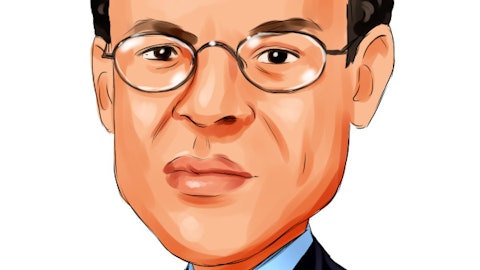Manan Gosalia : Great. Thank you.
Operator: Our next question comes from Devin Ryan from JMP Securities.
Devin Ryan: Good morning. Hey, I guess first I want to start on the move in the dollar. So, for Lazard, that’s a bigger deal than some of your peers. And so, I’d like to just maybe remind us, kind of the order of magnitude, the benefit of the weakening dollar on both advisory and asset management? And then just, kind of bigger picture how that’s driving strategic dialogue with clients as well just given the market shift we’ve seen here recently
Kenneth Jacobs: Let’s break it into two parts. Evan, do you want to take the impact on the asset management business and I’ll cover the advisory and the client side?
Evan Russo: Of course. So Devin, as we pointed out in past calls, our asset management business is certainly weighted towards non-U.S. dollar AUM. Approximately two-thirds or so of our AUM is in securities that are non-U.S. dollars. So that translation impact has had a big impact on our AUM generally as a firm over the last several years. I mean even last year the FX that we call out was a $9 billion negative just that translation impact of our securities. So, it certainly is a positive as you’ve seen just in the last four months. So, Q4 plus January, where you’ve seen a significant turnaround on the FX side with a weakening dollar. So that plays in just both on the translation of AUM. It also speaks to the way in which the investor sentiment and general investor sentiment of allocation of portfolios has been changing a little too.
There’s been a big focus on U.S. dollar investments, U.S. centric investments, and people shifting portfolios to where the growth has been, and where market appreciation has been, which has been more U.S. focused than international global and certainly EM over the last several years. So as that starts to tilt and as people start to think about an environment where you may have several years of a, not only a weakening U.S. dollar, but certainly not a strengthening U.S. dollar that starts to abate as we just called out, that would certainly be a positive for our business. And that generally will work from both the focus of investors thinking about allocating their portfolios, as well as the translation of AUM back into our business as well.
Kenneth Jacobs: And on the advisory side, two things to comment on. First, the advisory business itself less impacted one way or the other we tend to have a lot of our costs in local currency where the revenues are, so not as much impact. And in terms of clients, look, again, over time, I don’t think that small shifts in currency make that much difference in terms of cross-border activity. When you have a large shift, maybe there’s a unique positioning of a company. It’s cash flows, the way it can be financed that would help, but generally speaking, if someone’s buying an asset in a different geography, they will finance it accordingly. And so, one way or the other, it hasn’t had as much impact as I think many observers think it does.
Devin Ryan: Okay, great. Just a follow-up question on the growth of the firm. So, the , I think, is up about 30% over the last three years. We’ve tracked a lot of €“ managing directors have joined the firm, so you guys have been I think more active over the last three, four, five, years in recruiting than you had been for some period of time. So, maybe just talk a little bit about just given the lags that occur when you bring somebody in externally or even promote somebody to, kind of hitting full run rate of potential? Like how this, kind of shift has set you up maybe for growth move forward? And then just also just expectations for continuation of bringing in senior talent just already pace we’ve seen?
Kenneth Jacobs: Peter, you want to take this one?




